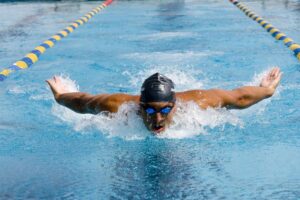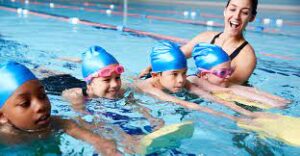Back to: Physical Health Education SS2
Welcome to today’s class!!
We are thrilled to have you in our class!!
In today’s Physical and Health Education class, we will be learning about Swimming
Swimming

Before we start, here are interesting things to note about swimming:
- As well as being fun, swimming is a great way to keep fit and make friends.
- Swimming is a healthy activity that you can continue for a lifetime.
- Swimming is a low-impact activity that has many physical and mental health benefits.
The origin of swimming has some roots in what was referred to as, Competitive Swimming.
Competitive swimming continued to grow in popularity during the 1800s and was included in the first modern Olympic Games in Athens in 1896. In 1904, the Olympics in St. Louis included the 50-, 100-, 220-, 440-, 880-yard and one-mile freestyle, the 100-yard backstroke and 440-yard breaststroke, and a 4 x 50-yard freestyle relay.
By the 20th century, swimming had become very popular. Indoor pools were beginning to appear, most towns with populations over 20,000 had public outdoor pools, and swimming clubs became increasingly popular for recreation. Women participated for the first time in swimming in the Olympic Games in Stockholm in 1912, and Johnny Weissmuller became the first person to swim 100 meters in less than one minute.
Swimming For Recreation
Swimming is a great recreational activity for people of all ages. Recreational swimming can provide you with a low-impact workout and it’s a good way to relax and feel good.
Common swimming styles in recreational swimming are:
- breaststroke
- backstroke
- sidestroke
- freestyle.
Some people who enjoy swimming want to take it to a competitive level. This can provide the health benefits of a vigorous workout as well as the fun and thrill of competition.
The main strokes used in competitive swimming are:
- breaststroke
- freestyle
- backstroke
- butterfly.
The distances swum in competition swimming can vary from 50 meters in a pool to much further distances in open water.
Equipments Used In Swimming
- Swimsuit

You’ll need a swimsuit. Like many other things, technology has entered the swimsuit arena as well. Fabrics are designed for minimal resistance through the water, they tend to last a long time, and they resist fading even when used repeatedly in chlorinated pools. Of course, not all of us would be comfortable in the skimpy racing suits that you see Olympians wear, but the good news is that you can find more modest suits at sporting goods and department stores. Comfort is the most important quality in selecting a swimsuit.
- Goggles

Goggles protect your eyes from chlorine (and anything else that may be in the water), and they help you keep your eyes open while you swim so that you can see where you’re going. You can even get prescription swim goggles if you wear glasses.
- Bathing caps

Bathing caps can serve several purposes. Some pool managers will require individuals with long hair to wear caps to keep hair from getting into the pool, and some people just like to protect their hair from the chlorine in the water. You may also decide to wear a bathing cap to cut down on resistance in the water. This really works, and so if you’re looking to increase your time a bit, a bathing cap might help. Choose the one that fits your head and is most comfortable.
- Floatation Devices

There are a number of flotation devices and other equipment available to help you learn how to swim, improve your swimming times if you start to get competitive, and add resistance to your water workouts to build muscular strength and tone.
Flotation devices help keep you afloat so that you can slow down and work on your swim stroke without sinking or causing too much fatigue, and they help with confidence for individuals who don’t know how to swim.
Evaluation
Explain what you understand by Competitive Swimming
Reading Assignment
What are the main strokes used in Competitive Swimming?
Weekend Assignment
List five equipment Used in Swimming.
We hope you enjoyed today’s class. In our next class, we will be learning about Swimming II
Let us know your thoughts and questions in the comment section, and we will attend to them as fast as we can.
